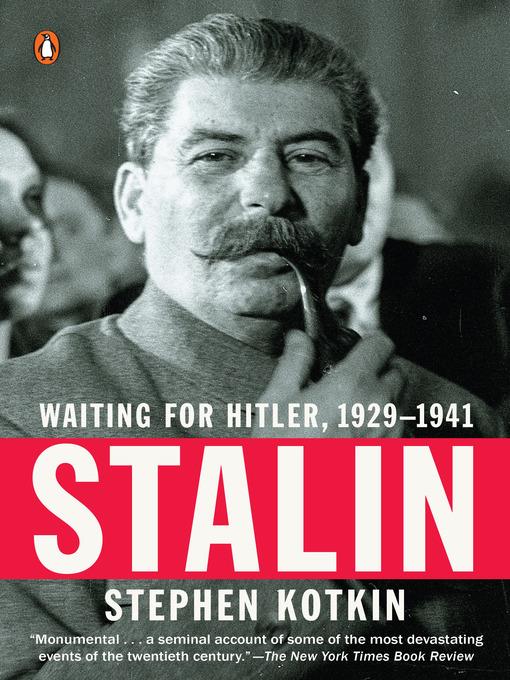
Stalin
Waiting for Hitler, 1929-1941
کتاب های مرتبط
- اطلاعات
- نقد و بررسی
- دیدگاه کاربران
نقد و بررسی

June 1, 2017
The John P. Birkelund Professor in History and International Affairs at Princeton University, Kotkin offers his second in a magisterial three-volume biography of Soviet leader Joseph Stalin, following Pulitzer Prize finalist Stalin. Vol. 1: Paradoxes of Power, 1878-1928. In the first volume, Kotkin remade our understanding of Stalin and the larger history of the time.
Copyright 2017 Library Journal, LLC Used with permission.

September 15, 2017
The massive second volume of the author's biography of the Russian dictator who went from "learning to be a dictator to becoming impatient with dictatorship and forging a despotism in mass bloodshed."Here, we follow Stalin's murderous consolidation of power in the 1930s in tandem with the parallel rise of Hitler in Germany. Kotkin (History and International Affairs/Princeton Univ.; Stalin: Paradoxes of Power, 1878-1928, 2014, etc.) begins with an eerie literary portrait of a rather ordinary man suffering some physical deformities that made him self-conscious; he also displayed coarse manners from his peasant Georgian upbringing and voracious reading habits that drove him always to "better" himself. By 1929, this former seminarian and revolutionary had replaced God with the Marxist-Leninist doctrine and taken the helm of the Soviet state by both chance ("the unexpected early death of Lenin") and "aptitude," encapsulating his own personal paranoia within the country's sense of "capitalist encirclement." Building an entirely new world through class struggle and socialism was his historical mission, and he would achieve this through whatever means were required. His plan of forced wholesale collectivization involved the liquidation of the kulaks as a class: "These are the inevitable 'costs' of revolution," he wrote in a letter to Maxim Gorky. The drought and severe food shortages of 1931-1933 caused mass flight and the starvation of millions, rendering the country vulnerable to Japanese invasion. By 1937, Stalin's "obsession with menace," both domestically and externally, spurred the Great Terror: mass arrests, show trials of "Trotskyites," and murders of "enemies" far and wide, including the purge of his inner circle and officer corps. Kotkin emphasizes that there was no "dynamic" urging Stalin on, save his own plan "to approve quota-driven eradication of entire categories of people." He left his military purged of experienced officers and completely unprepared for Hitler's advance. In this monumental work of research, the author chillingly depicts Stalin's methodical, "lucidly strategic" rise to murderous despot. A well-written, finely detailed installment in a definitive biography--sure to receive many prize nominations this year.
COPYRIGHT(2017) Kirkus Reviews, ALL RIGHTS RESERVED.

Starred review from September 25, 2017
Kotkin, a professor of history at Princeton, follows Stalin: Paradoxes of Power, 1878–1928 with a magisterial second entry in this multivolume biography. He integrates a massive body of newly available documents with extant scholarship, comprehensively detailing the development of the U.S.S.R. and the nature of Stalin’s rule. Stalin’s commitments to reshaping Eurasia into a multinational communist empire and reconstructing Russia as an industrial socialist society necessitated a synergy of foresight and micromanagement, Kotkin writes. The fundamental challenge faced by the Soviets, initially posed by global capitalism and later embodied by Hitler’s Third Reich, required not merely a dictator, posits Kotkin, but a despot. That despotism began with agricultural collectivization in the early 1930s and advanced during the mass terror of 1936–1938, shaping the U.S.S.R. into a warfare state “unprecedented for even a military-first country.” Kotkin addresses crucial subjects that remain contentious: he presents the famine of 1931–1933 as a result of Stalin’s “magical thinking” rather than a deliberate campaign of rural genocide and interprets the great terror as “a matter of statecraft” necessary for Soviet survival in the total war Stalin sought to avoid. Stalin’s obsession with Nazi power resulted in policies of “deterrence as well as accommodation”—and generated miscalculation leading to war. Kotkin’s account is a hefty challenge, but an eminently worthwhile one. Maps. Agent: Andrew Wylie, Wylie Agency.

























دیدگاه کاربران